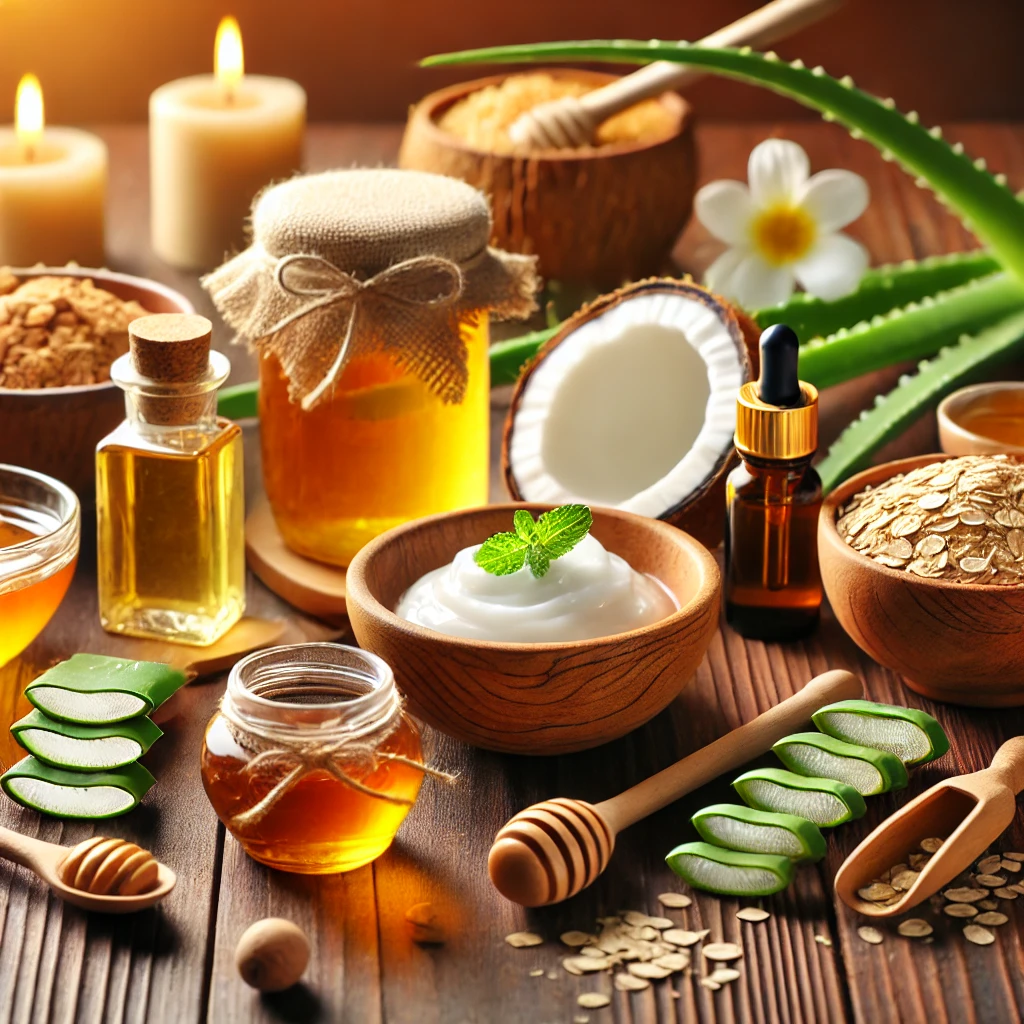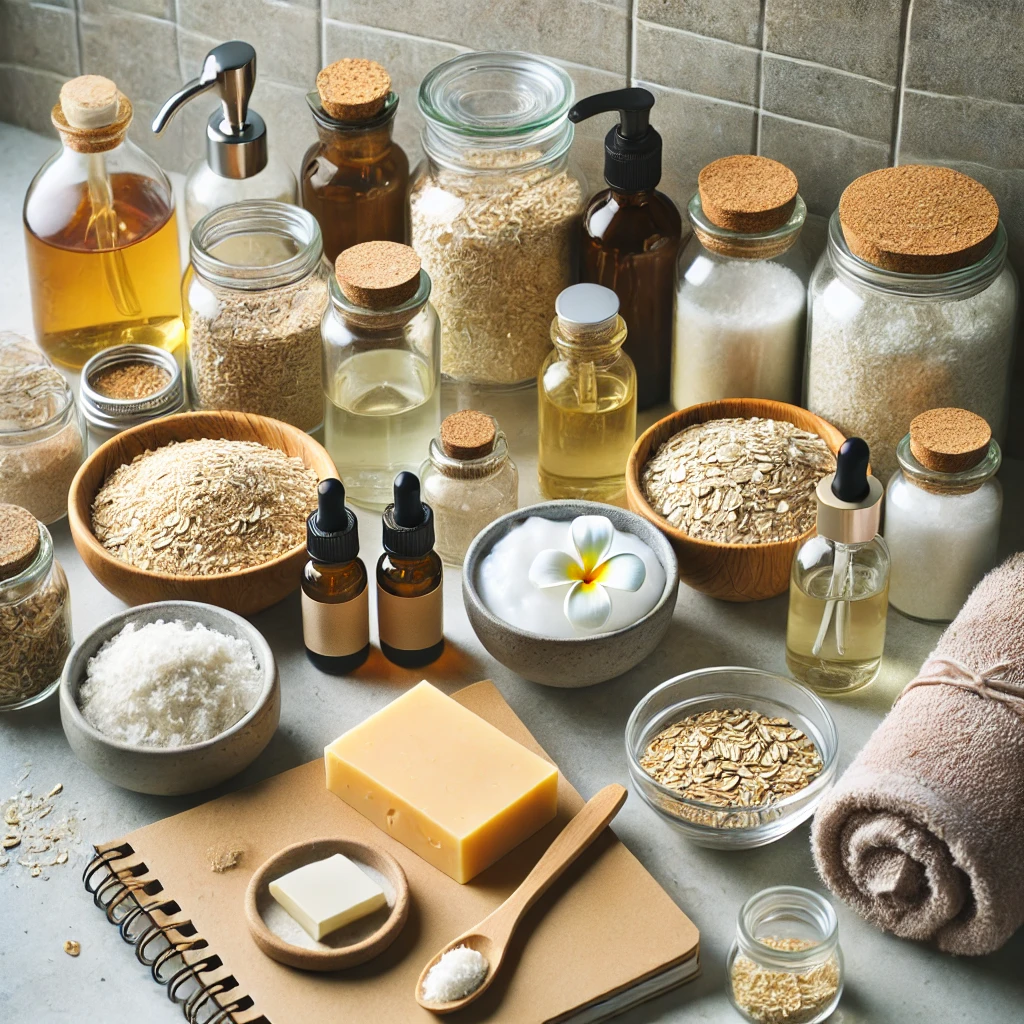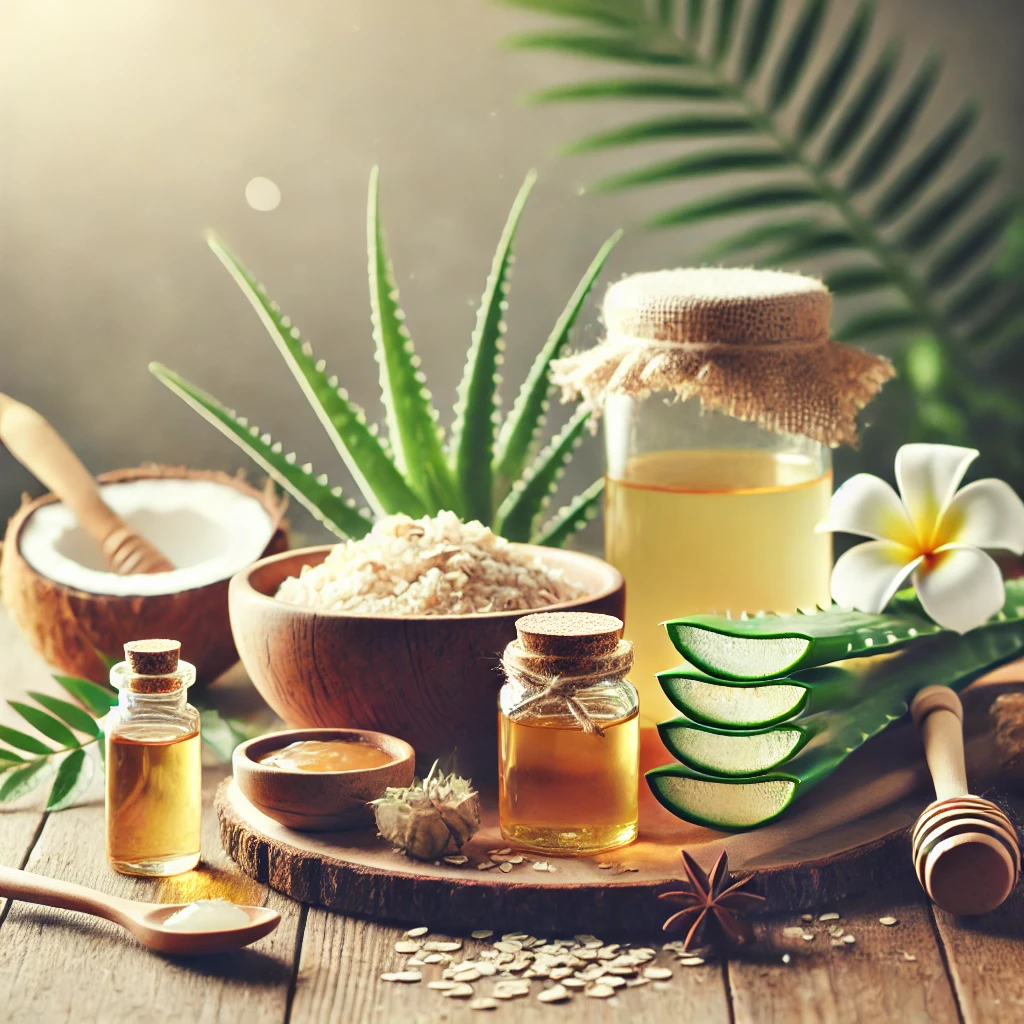The Ultimate Guide to Natural Skin Care Homemade: 5 Powerful Remedies for Glowing Skin
With the growing interest in clean beauty, more and more people are seeking to replace their skincare routines with natural alternatives. Commercial skincare products often contain synthetic chemicals that may lead to irritation, hormonal imbalance, or environmental damage. By creating your own skincare products at home, you can take control of what goes on your skin, using fresh, pure ingredients to target your specific skin concerns.
In this in-depth guide, we’ll explore five proven natural skincare remedies that you can make at home, each designed to nourish, soothe, and improve your skin’s health. These are backed by science, easy to implement, and can transform your skincare regimen.
Why Opt for Natural Skin Care at Home?
1. Reducing Exposure to Harsh Chemicals
Commercial skincare products often contain harmful chemicals such as parabens, sulfates, phthalates, and synthetic fragrances. These can disrupt the skin’s natural barrier, cause irritation, or even interfere with hormonal balance. In contrast, natural ingredients used in homemade skincare are generally free from these harmful additives, offering a cleaner alternative.
- Parabens, for example, are preservatives that mimic estrogen and have been linked to breast cancer.
- Sulfates strip the skin of natural oils, causing dryness and irritation.
Natural skin care allows you to avoid these toxins, keeping your skin healthy in the long run.
2. Cost-Effectiveness
High-quality skincare products often come with a hefty price tag. However, many natural skincare ingredients—like honey, coconut oil, and aloe vera—are already in your kitchen and can be used to create simple yet effective products without the cost burden.
3. Environmentally Friendly
By making your skincare products, you can reduce packaging waste and environmental harm. Many store-bought products come in single-use plastic, which contributes to pollution. Moreover, the production of synthetic chemicals often involves energy-intensive processes that are damaging to the environment.
Top 5 Natural Skin Care Homemade Remedies for Healthy, Glowing Skin

1. Honey: The All-Natural Humectant and Antibacterial Powerhouse
Honey has been used for centuries for its skin-healing properties. It’s rich in antioxidants, has antibacterial properties, and is a powerful humectant, meaning it draws moisture into the skin.
How Honey Works:
- Antibacterial & Antimicrobial Properties: Honey contains enzymes that produce hydrogen peroxide, which acts as a mild antiseptic. This makes honey excellent for acne-prone skin by helping to reduce bacterial growth on the skin.
- Moisturizing Effects: Honey’s humectant properties help to hydrate the skin by drawing moisture from the environment and locking it in.
How to Use:
- Acne-Fighting Honey and Cinnamon Mask: Mix 1 tablespoon of raw honey with 1 teaspoon of cinnamon powder. Cinnamon is also antimicrobial, making it an excellent addition to acne-fighting remedies. Apply the mixture to clean skin, leave it on for 15 minutes, and rinse with lukewarm water. Repeat twice a week for best results.
Scientific Backing:
A study published in Complementary Therapies in Medicine (2017) demonstrated that honey, especially when paired with cinnamon, significantly reduced acne lesions over a 4-week period compared to conventional treatments. This makes it a great natural alternative to harsh acne treatments.
2. Aloe Vera: The Ultimate Skin Soother and Healer
Aloe vera is one of the most versatile plants used in skincare. It’s widely known for its ability to soothe irritated or inflamed skin, making it particularly effective for treating burns, eczema, and sensitive skin conditions.
How Aloe Vera Works:
- Anti-Inflammatory Properties: Aloe vera contains polysaccharides, which help to repair and hydrate the skin while reducing redness and inflammation.
- Healing Properties: Aloe contains vitamins A, C, and E, all of which contribute to the healing and regeneration of damaged skin.
How to Use:
- Sunburn Soother: For quick sunburn relief, simply cut a fresh aloe vera leaf, scoop out the gel, and apply it directly to the burned areas. Aloe’s cooling effect will reduce inflammation and promote faster healing. Repeat 2-3 times a day until the burn heals.
Case Study:
A 2019 study published in Phytomedicine concluded that aloe vera gel significantly accelerated the healing process of burn wounds compared to conventional treatments. This highlights its effectiveness not only in treating sunburns but also in aiding the recovery of other minor wounds and skin abrasions.
3. Coconut Oil: The Deeply Nourishing Moisturizer
Coconut oil is a popular ingredient in natural skincare because of its moisturizing and healing properties. Rich in medium-chain fatty acids, coconut oil is an excellent emollient that helps strengthen the skin barrier, making it particularly beneficial for dry or damaged skin.
How Coconut Oil Works:
- Rich in Fatty Acids: Coconut oil’s high lauric acid content provides both moisture and antimicrobial benefits, making it suitable for treating dry, cracked skin or even fungal infections like athlete’s foot.
- Anti-Inflammatory: Coconut oil has been shown to reduce inflammation and promote skin repair.
How to Use:
- Moisturizing Balm: Mix 2 tablespoons of coconut oil with 2 tablespoons of shea butter. Optionally, add a few drops of lavender essential oil for additional calming effects. Apply this balm to your skin after showering to lock in moisture and soothe dry patches.
Scientific Insight:
Research published in the International Journal of Dermatology (2018) demonstrated that coconut oil not only moisturizes but also improves skin barrier function in patients with eczema. It was found to be as effective as mineral oil but with the added benefit of being natural and less likely to cause irritation.
4. Oatmeal: Gentle Exfoliation and Soothing for Sensitive Skin
Oatmeal is widely used in skincare for its calming and anti-inflammatory properties. Colloidal oatmeal, in particular, is ground to a fine powder that is easily absorbed by the skin. It’s an excellent natural ingredient for soothing conditions like eczema and rosacea.
How Oatmeal Works:
- Anti-Inflammatory and Antioxidant Properties: Oatmeal contains avenanthramides, which have been shown to reduce inflammation and itching.
- Natural Cleanser: Oatmeal saponins act as gentle cleansing agents, effectively removing dirt and oil from the skin without stripping it of its natural moisture.
How to Use:
- Soothing Oatmeal Mask: Mix 1/2 cup of finely ground oatmeal with 2 tablespoons of plain yogurt and 1 teaspoon of honey. Apply to the face and leave on for 20 minutes before rinsing off. This mask is especially good for calming irritated skin.
Case Study:
A 2020 study in Clinical, Cosmetic and Investigational Dermatology found that regular use of colloidal oatmeal reduced the severity of eczema and improved skin hydration. Patients who used oatmeal-based treatments twice a day saw significant improvement in itchiness and inflammation.
5. Tea Tree Oil: Potent Antibacterial and Acne Fighter
Tea tree oil is one of the most researched natural remedies for acne and bacterial infections. With its powerful antimicrobial and anti-inflammatory properties, it’s a must-have for those dealing with acne or oily skin.
How Tea Tree Oil Works:
- Antimicrobial Action: Tea tree oil contains terpinen-4-ol, a compound that kills bacteria, viruses, and fungi, making it particularly effective against acne-causing bacteria like Propionibacterium acnes.
- Anti-Inflammatory: It reduces redness and swelling associated with acne lesions.
How to Use:
- Spot Treatment for Acne: Dilute tea tree oil by mixing 1 drop of oil with 9 drops of a carrier oil (such as jojoba or almond oil). Apply this solution to acne spots using a cotton swab. Repeat daily until the blemish fades.
Scientific Backing:
A study published in the Australian Journal of Dermatology found that tea tree oil gel was as effective as benzoyl peroxide in reducing acne lesions over a 12-week period but had fewer side effects like irritation and dryness.
Creating a Personalized Natural Skincare Routine

Step 1: Understand Your Skin Type
The key to an effective natural skincare routine lies in understanding your skin type. Whether you have oily, dry, sensitive, or combination skin, knowing this will guide your ingredient choices.
- Oily Skin: Opt for light, antibacterial ingredients like tea tree oil and witch hazel.
- Dry Skin: Focus on hydrating ingredients like coconut oil, shea butter, and honey.
- Sensitive Skin: Use soothing ingredients like oatmeal and aloe vera to calm irritation.
Step 2: Design Your Basic Routine
- Cleanser: Start with a gentle cleanser. For example, mix honey with warm water for a natural antibacterial face wash.
- Toner: Use a natural toner like diluted apple cider vinegar (for oily skin) or rose water (for sensitive skin) to balance pH.
- Moisturizer: Depending on your skin type, apply coconut oil, aloe vera, or a blend of carrier oils.
- Exfoliant: Use a gentle exfoliant like oatmeal or coffee grounds mixed with a carrier oil once or twice a week.
Frequently Asked Questions
1. What are the benefits of using Natural Skin Care Homemade products?
Natural skin care homemade products offer several benefits, including the elimination of harmful chemicals, customization to suit your skin type, and the use of eco-friendly ingredients. These remedies are often gentler on the skin, making them ideal for individuals with sensitive skin or specific concerns like acne, dryness, or eczema. Additionally, they are cost-effective and reduce environmental impact by minimizing packaging waste.
2. How do I start a Natural Skin Care Homemade routine?
To start a natural skin care homemade routine, first determine your skin type—whether it’s oily, dry, sensitive, or combination. Based on this, choose simple natural ingredients that address your skin’s needs. For example, honey and aloe vera work well for hydration and soothing, while tea tree oil and witch hazel are ideal for oily or acne-prone skin. Incorporate a natural cleanser, toner, moisturizer, and exfoliant into your daily regimen, using homemade products.
3. Are there any risks to using Natural Skin Care Homemade remedies?
While natural skin care homemade remedies are generally safe, some natural ingredients can cause allergic reactions or skin irritation in sensitive individuals. For instance, essential oils like citrus or tea tree oil can be too harsh if used undiluted. Always conduct a patch test before trying a new homemade product to ensure that your skin doesn’t react negatively. Remember, just because something is natural doesn’t mean it’s universally safe for all skin types.
4. Can Natural Skin Care Homemade remedies treat acne effectively?
Yes, many natural skin care homemade remedies are effective at treating acne. Ingredients like tea tree oil, which has antibacterial properties, and honey, which helps reduce inflammation and fight bacteria, are commonly used in natural acne treatments. These remedies help control breakouts without the harsh side effects of chemical-based products, like benzoyl peroxide or salicylic acid.
5. How long does it take to see results from Natural Skin Care Homemade remedies?
Results from natural skin care homemade remedies usually take time, typically a few weeks of consistent use. Unlike chemical products that may show quicker results but can irritate the skin, natural remedies work gently and gradually. For example, using honey or aloe vera for hydration or tea tree oil for acne might take several weeks of regular application to notice significant improvements.
6. Can I make Natural Skin Care Homemade products in bulk, and how long do they last?
You can make natural skin care homemade products in bulk, but their shelf life depends on the ingredients used. Products without preservatives, like homemade moisturizers or masks, generally last 1-2 weeks if stored in airtight containers and refrigerated. Some ingredients, like honey or coconut oil, have longer shelf lives and may last several months. Always check for signs of spoilage, such as changes in smell or texture, before using.
7. What are the best ingredients for a Natural Skin Care Homemade routine for dry skin?
For dry skin, natural skin care homemade remedies should focus on hydration and moisture retention. Ingredients like coconut oil, shea butter, avocado, and honey are excellent for moisturizing. You can create hydrating masks using avocado and honey or use coconut oil and shea butter as rich, nourishing moisturizers for daily use.
8. Can Natural Skin Care Homemade remedies help with anti-aging?
Yes, natural skin care homemade remedies can help with anti-aging. Ingredients like aloe vera, which is rich in vitamins A, C, and E, promote skin regeneration and hydration. Honey’s antioxidant properties can also help reduce fine lines and improve skin elasticity. Incorporating these ingredients into your routine can support a more youthful, glowing complexion over time.
9. Are Natural Skin Care Homemade products safe for sensitive skin?
Natural skin care homemade products can be very effective and safe for sensitive skin, but caution is necessary. Ingredients like oatmeal, aloe vera, and chamomile are known for their soothing properties and are excellent choices for sensitive skin. However, it’s important to avoid highly acidic or abrasive ingredients like lemon juice or baking soda, which may cause irritation. Always do a patch test before applying a new product to your face.
10. How can I exfoliate using Natural Skin Care Homemade products?
You can exfoliate using a variety of natural skin care homemade products like oatmeal, sugar, or coffee grounds mixed with a carrier oil like coconut or olive oil. These natural exfoliants help remove dead skin cells gently without causing irritation. Exfoliation can be done once or twice a week, depending on your skin’s sensitivity.
Conclusion: The Power of Natural Skin Care at Home
Natural skincare remedies are not only effective but also customizable and eco-friendly. By incorporating these time-tested ingredients into your daily routine, you can address specific skin issues without exposing your body or the environment to harmful chemicals. Patience, consistency, and mindfulness of your skin’s needs will lead to visible, long-term improvements.
Key Takeaways:
- Use honey for hydration and antibacterial action.
- Aloe vera is ideal for soothing and healing irritated skin.
- Coconut oil offers deep moisturization and skin repair.
- Oatmeal is a gentle exfoliant and soothing remedy for sensitive skin.
- Tea tree oil effectively treats acne and reduces inflammation.
By adopting a natural skincare routine, you can achieve glowing, healthy skin, while also contributing to a more sustainable and eco-conscious lifestyle.
For more insights on enhancing your beauty naturally, check out our in-depth guide on natural beauty tips and holistic skincare at Natural Beauty. Discover how to nurture your skin from the inside out with easy-to-follow advice and expert tips!
For additional information on the benefits and science behind natural skincare ingredients, visit Healthline’s Guide to Natural Skin Care. It offers a comprehensive look at the effectiveness of various natural remedies and their uses in skincare.







